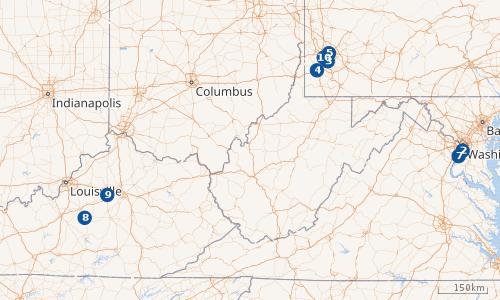American Whiskey Trail
The American Whiskey Trail is the name of a promotional program supported by the Distilled Spirits Council of the United States that promotes the distilled beverage industry in the U.S. The Trail was first promoted to the public on September 28, 2004.[1]
Key sites along the trail
 |
| American Whiskey Trail 1 2 3 4 5 6 7 8 9 10 |
The American Whiskey Trail consists of various historical sites – some with operating distilleries – that are open to the public for tours. Sites along the American Whiskey Trail can be visited in any order or sequence desired, although the George Washington Distillery is promoted as the "gateway" to the trail and is a common starting point.[2]
- Fraunces Tavern Museum in Manhattan, New York[3]
- Gadsby's Tavern Museum in Alexandria, Virginia[3]
- George Washington Distillery Museum in Mount Vernon, Virginia[4]
- Oliver Miller Homestead in South Park, Pennsylvania[3]
- Oscar Getz Museum of Whiskey History in Bardstown, Kentucky[3]
- West Overton Village & Museums in Scottdale, Pennsylvania[3]
- Woodville Plantation (John and Presley Neville House) in Bridgeville, Pennsylvania[3]
- Bradford House Museum in Washington, Pennsylvania
- Allegany Museum in Cumberland, Maryland[3]
Besides recognized historic sites, a number of operating whiskey distilleries are open to the public for tours and, in many cases, tastings. Most are located in close proximity to each other in Kentucky, although a few are located in Tennessee, Pennsylvania, Utah, and West Virginia.
- Buffalo Trace in Frankfort, Kentucky
- George Dickel in Tullahoma, Tennessee[5]
- Jack Daniel's in Lynchburg, Tennessee[5]
- Jim Beam American Stillhouse in Clermont, Kentucky[5]
- Jim Beam Urban Stillhouse in Louisville, Kentucky[5]
- Maker's Mark in Loretto, Kentucky[5]
- 1792 Bourbon Distillery in Bardstown, Kentucky
- Wild Turkey in Lawrenceburg, Kentucky[5]
- Woodford Reserve in Versailles, Kentucky[5]
- Wigle Whiskey in Pittsburgh, Pennsylvania
- Four Roses in Lawrenceburg, Kentucky
- Old Forester in Louisville, Kentucky
- Angel's Envy in Louisville, Kentucky[5]
- Bulleit Frontier Whiskey Experience (Stitzel-Weller Distillery) in Louisville, Kentucky[5]
- Town Branch in Lexington, Kentucky
- O.Z. Tyler in Owensboro, Kentucky
- High West Distillery in Wanship, Utah[5]
- Smooth Ambler Distillery in Maxwelton, West Virginia[5]
Distilleries connected to the trail
In addition to sites and distilleries tied to the history of American whiskey production, the Distilled Spirits Council provides information and promotes a range of other distilleries around the country in conjunction with promotion of the American Whiskey Trail. The list includes two key rum distilleries – Bacardi in Catano, Puerto Rico, and Cruzan in St. Croix, U.S. Virgin Islands – along with various small distilleries. Examples include Golden Moon Distillery, a gin and liqueur producer in Colorado; Koloa Rum Company, a rum producer in Hawaii; Limestone Branch Distillery, a whiskey producer in Kentucky; Black Button Distilling, a whiskey and gin producer in New York; and Tenn South Distillery and Nelson's Green Brier Distillery, two whiskey producers in Tennessee.
See also
References
- Greenfield, Heather. "Cheers, George. Mount Vernon distillery is gateway to the American Whiskey Trail". The Free Lance-Star.
- "Welcome | American Whiskey Trail". www.americanwhiskeytrail.com. Retrieved 2018-09-30.
- "Historical Sites | American Whiskey Trail". www.americanwhiskeytrail.com. Retrieved 2018-09-30.
- "George Washington's Distillery | American Whiskey Trail". www.americanwhiskeytrail.com. Retrieved 2018-09-30.
- "AWT Distilleries | American Whiskey Trail". www.americanwhiskeytrail.com. Retrieved 2018-09-30.
Further reading
- Barr, A. (1999). Drink: A Social History of America. New York: Carroll & Graf.
- Grimes, William (1993). Straight Up or On the Rocks: A Cultural History of American Drink. New York: Simon & Schuster.
- Lender, Mark E. & Martin, James K. (1982). Drinking in America: A History. New York: The Free Press.
- Popham, Robert E.; Israel, Yedy; et al., eds. (1978). "The Social History of the Tavern". Research Advances in Alcohol and Drug Problems. New York: Plenum. 4: 255–302.
- Rorabaugh, William J. (1979). The Alcoholic Republic: An American Tradition. New York: Oxford University Press.
- Rorabaugh, William J. (1991). "Alcohol in America". Magazine of History. 6: 17–19.
- Roueché, Berton (1960). The Neutral Spirit: A Portrait of Alcohol. Boston: Little, Brown & Co.
External links
- American Whiskey Trail (official website), Distilled Spirits Council of the United States